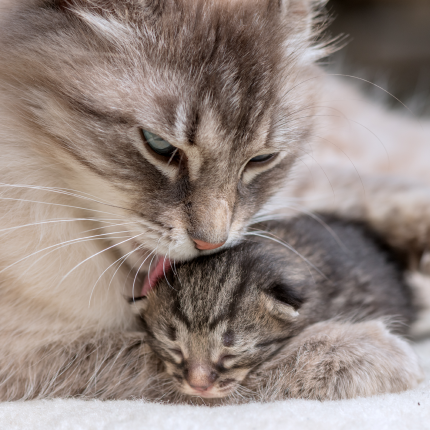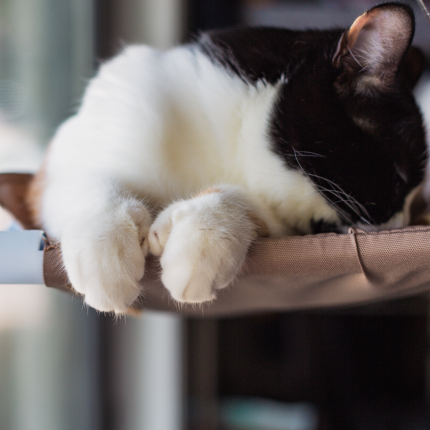How To Prepare For Kittens With Your Pregnant Cat

Are you ready for the adorable queen you care for to give birth to her kittens? Is this the first time you’ve seen your cat give birth? Although it is ideal for letting a mother cat do her job when it comes to giving birth to her kittens, you should still be familiar with how to care for kittens before they are born.
You can get your cat ready for pregnancy by ensuring that she is up to date on her vaccines before she becomes pregnant. However, if it is too late, you should consult a veterinarian for assistance. Your veterinarian will give you advice on the most effective approach to getting your cat ready to give birth, including how to treat worms and fleas in a way that is safe while she is pregnant.
In the last three to four weeks before she gives birth, your cat will need to consume an additional 25 percent of her normal amount of Food while continuing her regular feeding regimen. She will need different Food to sustain herself till the kittens are weaned.
You’ll see a change in how she acts during the week before she gives birth to her kittens. She’ll most likely be looking for the ideal place to give birth. Prepare your cat for birth by providing a clean, warm, and secluded area for her to give birth to her kittens. Warm blankets and clean linens should be provided, which can be washed and replaced. Before, during, and after birth, your cat should have free access to fresh water. To keep the kittens from drowning, ensure her water source is safely out of reach.
Things That Should Be Done Immediately After the Birth of a Newborn Kitten
When the time comes for your cat to give birth, observe her from a distance while she is in labor. You don’t want to disturb or put her in an awkward situation, do you? It usually takes anything from five to thirty minutes after your cat starts pushing before the kittens are born. In a typical case, you will not be required to step in, but if any difficulties emerge, you will be available to assist her.
advertisement
Learn how to assist a pregnant cat in giving birth by keeping an eye out for the following issues:
- When a kitten is still being delivered, its mother is too exhausted to continue giving birth. If the kitten has not entirely expelled its stool within a few seconds, use clean hands to very gently pull it out downwards, and then contact a veterinarian for help.
- If the mother does not successfully cut the umbilical cord, you need to take over. Using clean sewing thread, tie off twice, leaving a gap in between, and then tie again further out. Start the first tie-off around three centimeters from the body of the kitten.
- After that, rip between the two knots carefully using very clean hands. If the mother does not clean the kitten, you can use a clean, soft kitchen towel to swiftly and gently remove any membranes that may be present on the head of the kitten.
- To clean the kitten’s nose and mouth, you must first open its mouth. Rub the kitten in a circular motion to help it become more alert and promote respiration. After giving delivery, it is common practice for the mother to consume the newborn child.
When the mother is not around to keep the kittens warm, a warm, well-covered hot water bottle should be provided for them.
As previously stated, it is unlikely that you will need to intervene when your cat is giving birth, but if you do, please seek veterinary advice immediately. The kittens could become infected, injured, or rejected by their mother.
Let’s go over how to prepare for the kittens’ birth; during this joyful time, you’ll want to ensure you have everything you need.
Differences in Food: A diet planned to keep the mother cat and her expanding litter of kittens healthy is beneficial to a pregnant cat, just as it is to a pregnant human. Monitoring the stages of her pregnancy is one of the most effective ways to give her the appropriate nutrition at the proper time. Keep a record of the first time your cat becomes pregnant if feasible.
During the first two months of her pregnancy, you should continue to provide your cat with the nutrient-rich diet that she is accustomed to receiving. It would help if you considered switching her diet to a higher-calorie canned kitten food brand during the third trimester. When her uterus is pressing up on her stomach, leaving her with less capacity for Food, she will be able to acquire adequate nourishment from this kitten food that is higher in calories because it won’t cause discomfort after she eats it.
Keep giving her the Food intended for her kittens until she has successfully weaned all of her young. During this physically taxing time of her life, this helps ensure that she gets the adequate amount of protein and calories she needs.
Equipment: For emergencies and an alternative to kitten milk The most prudent thing to do is always to be ready for any unexpected events. At some point during the pregnancy, you should make an appointment for a professional assessment with the veterinarian (and first of all, congratulations!). This can help ensure that your cat is in good health and can provide you with direction regarding what to do in case of a problem.
Be sure to have dental floss if the mother forgets to finish tying off the chord. You should always have clean scissors on hand if you find yourself in a position where you need to cut the connection. If the navel area of the kitten ever becomes irritated or infected, you can use a minimal amount of iodine to clean it. This circumstance is highly improbable, though.
Last but not least, you should be prepared to feed the kittens by hand using a kitten milk replacer if the new mother cannot do so for any reason. It would be best if you got a customized formulation that contains colostrum. You will need to use a small dropper to feed them during the nursing period, which is around four weeks of continuous feeding followed by another four weeks for the process of weaning off the mother’s milk.
Nesting Space: When she is getting close to giving birth, your pregnant cat will look for a secure place and get out of the way to give birth to her kittens. Make a specialized location for her to nest in so that she has an easier time of it. You should use anything as simple as a cardboard box with high sides and line it with soft towels, blankets, newspapers, etc. Essentially, you may use anything soft and cozy that you don’t mind getting dirty as a nursing station. Just check to ensure that none of the things you use emits pungent smells or has strong odors. Kittens are born unable to hear or see, and the only way for them to identify their mother is by her fragrance.
Put her bowls for Food and water just outside the entrance to the nest, and position the litter box approximately two feet away from the door. Check to see that many people do not frequent the location you choose. It ought to be concealed in a remote and discrete place, one that humans, other animals, and dogs, as well as other pets, infrequently visit, if at all. If, despite your best attempts, your cat still gives birth to the kittens in another location, just let it alone. Her instincts guide her, and she will do what she wants to do despite her best efforts.
advertisement
Conclusion
The arrival of kittens is an occasion for joy. You will be the delighted parents of a few new family members who are delivered safely and sound if you are adequately prepared. Providing the queen with the necessary Food at the right time, constructing a secure nesting area for her close to delivery time, and planning emergency plans will help ensure a successful delivery when preparing for kitten birth.

Featured Articles

Greebles and Cats: The Origin and the Meaning
You may have seen an internet sensation concerning cats labeled “greebles.” Feel out of the loop? We’re here to help you. In 2019, Reddit user /user/literallyatree commented on a Reddit post about a cat that looks like it’s trying to slap a ghost. This user commented: “My family calls things…

Why Do Cats Roll Over Into Their Backs But Not Let You Touch Their Bellies?
It’s common knowledge dogs love to have their tummies rubbed when they freely lay down before you and roll onto their backs. But, if you’re also familiar with cats, you know that when they roll onto their backs with their bellies exposed, rubbing the belly will most likely result in…

Polydactyl Cats: Just More Beans to Love
Polydactyl cats have become extremely popular in recent times. As a result, more and more people are interested in learning more about this six-toed cat and want to get one of their own. If you are a cat lover intrigued by polydactyl cats, you have come to the right place….
